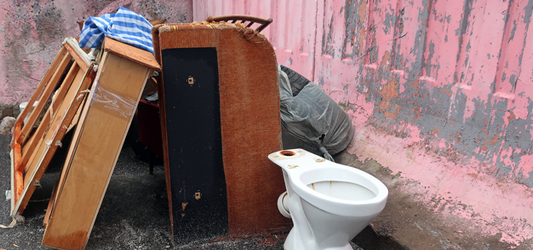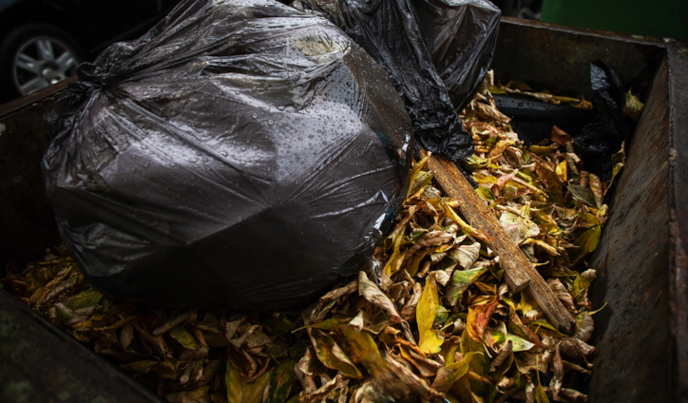
Updated July 16, 2025
When renting a dumpster, a certain amount of weight is included in the cost. If you go over the included weight limit for your dumpster, you will be charged overage fees that can add up quickly.
That's why it’s important to reduce or eliminate rain or snow from entering the dumpster, as well as loading wet materials—a wet dumpster load weighs significantly more than a dry load of the same material.
Understanding the weight of a wet dumpster load can help reduce the risk of incurring overage charges when renting a dumpster.
In this guide, we discuss:
- Average Weight of Common Materials
- How Much a Full Dumpster Weighs
- Water's Effect on Dumpster Weight
- How to Keep Debris Dry
- Average Dumpster Overage Fees
See Local Dumpster Rentals
Request availability and pricing from dumpster
rental companies near you.
Average Weight of Junk and Debris
General household junk is not heavy in general, nor is drywall or general wood debris, but when wet, they can become very heavy.
Understanding the average weight of common types of debris and junk is the first step to ensuring you don't get dumpster weight overage charges.
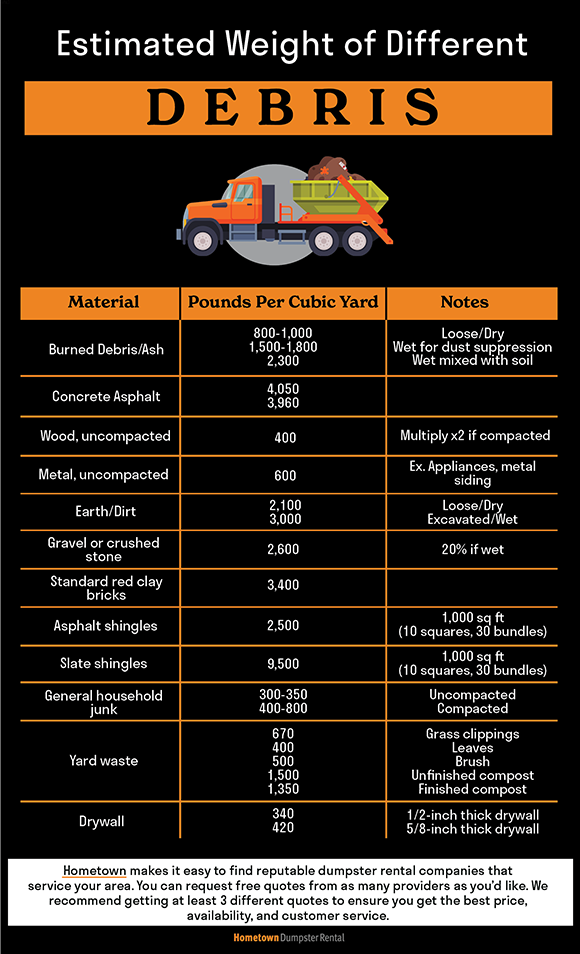
How Much a Full Dumpster Weighs
The type of debris and size of your dumpster will come into play when estimating your dumpster's weight when full. Generally speaking, household waste, like furniture and general trash, weigh significantly less than construction and demolition debris, like concrete, brick, or roofing shingles.
Overloading a dumpster can incur overage charges or the dumpster company may refuse to haul the dumpster before it's unloaded to a safe weight. This is why it's important to estimate accurately and keep water out of your dumpster.
The chart below shows estimated weight ranges for full dumpsters based on type of waste. Your debris may weigh more or less than these averages, but this will give you a general idea of what to expect.
Weight of Household Junk in a Dumpster
| Dumpster Size | Average Weight |
|---|---|
| 10 Yard | 0.5 - 1.25 tons |
| 15 Yard | 0.75 - 1.9 tons |
| 20 Yard | 1 - 2.5 tons |
| 30 Yard | 1.5 - 3.75 tons |
| 40 Yard | 2 - 5 tons |
Weight of Construction & Demolition Debris in a Dumpster
| Dumpster Size | Average Weight |
|---|---|
| 10 Yard | 1.25 - 5 tons |
| 15 Yard | 1.9 - 7.5 tons |
| 20 Yard | 2.5 - 10 tons |
| 30 Yard | 3.75 - 15 tons |
| 40 Yard | 5 - 20 tons |
Weight of Roofing Debris in a Dumpster
| Dumpster Size | Average Weight |
|---|---|
| 10 Yard | 3 - 3.75 tons |
| 15 Yard | 4.5 - 5.25 tons |
| 20 Yard | 6 - 7.5 tons |
| 30 Yard | 9 - 10.5 tons |
| 40 Yard | 12 - 13.5 tons |
Water's Effect on Dumpster Weight
Water is heavy, and it can have a dramatic effect on the weight of contents within a dumpster pretty quickly. A quick rainstorm that comes through and drops an inch of rain can equate to more than 100 gallons of water in a 40 yard dumpster.
Based on information provided by the U.S. Geological Survey (USGS), an inch of rainfall distributed evenly across the square footage of a typical 40-yard dumpster (22 ft L x 8 ft W) would equate to nearly 110 gallons of water.
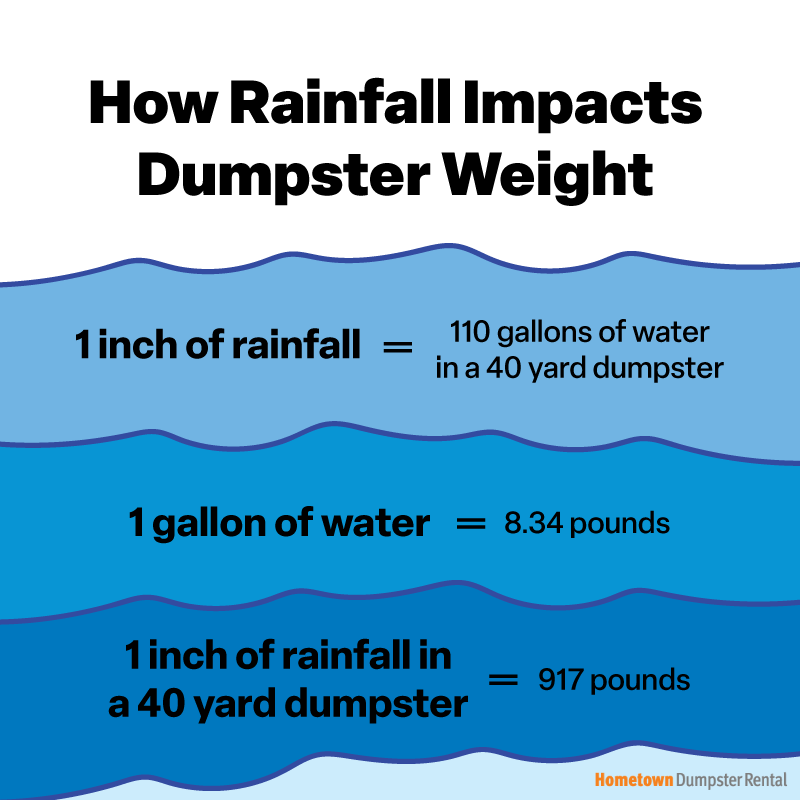
How much does 110 gallons of water weigh?
Each gallon of water weighs approximately 8.345 pounds, which means 110 gallons of water weighs just under 917 pounds, or nearly half a ton. This kind of weight can chip away at your included weight limit, increasing the chances of you going over and getting charged extra.
As you can see, one steady rainstorm could be the difference between meeting a dumpster’s weight limit and exceeding it.
Exceeding a dumpster's weight allowance can lead to overage fees averaging $50 to $100 per ton.
Porous materials, like drywall, wood, trash, and yard debris, soak up water more readily than nonporous materials, so take greater care to keep porous materials dry to ensure a lighter dumpster load.
Note: Some of the rain and moisture may drain out of the dumpster via drain holes and the door area, so this helps reduce the overall weight of the load but it does not eliminate the risk of going over your weight limit.
Learn more:
How to Keep Debris Dry
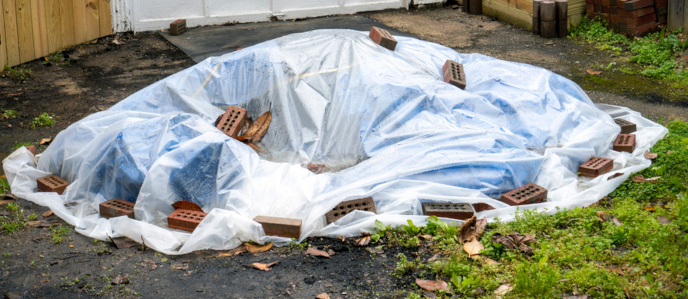
There are several strategies that will work to keep a dumpster load dry in just about any weather.
Wait for Dry Weather
If possible, your best bet is to wait to rent the dumpster when the forecast is showing dry conditions. However, if this isn't possible, make sure you are prepared.
Tarp It
If rain or snow is in the forecast, keep a large tarp on hand to place over the dumpster when not actively loading it. Some dumpster rental providers may be able to supply the tarp. Make sure to secure the tarp with rope or bungees to avoid it blowing away or shifting and allowing collected rain to fall into the dumpster.
Do not allow debris piles to sit uncovered outdoors while waiting to be loaded into the dumpster. As the materials become saturated, they can become much heavier, making it harder to load into the dumpster and increasing the total weight of the load. Tarp or cover debris piles sitting outside to prevent this.
Position Your Dumpster Strategically
It may be possible to place a dumpster inside a garage, barn or underneath other types of shelters to help keep it out of the elements. For larger dumpsters, this may not be possible, and some rental companies may not be able to accommodate this request due to equipment limitations.
Keep the Rental Period Short
Rather than allowing the dumpster to sit at your property for seven days (common rental period) or longer, rent a dumpster for a day or a few days to limit exposure to rain or snow. In some cases, a shorter rental period may also provide a discount depending on the rental company’s policies.
Average Dumpster Overage Fees
Dumpster rental companies charge a fee for going over the dumpster's weight allowance. Dumpster overage fees are generally around $50 to $100 per ton, though these fees can vary based on each company's policy.
Even if the weight of the load exceeds the weight allowance by just a few pounds, the dumpster rental company can charge you the fee for a full ton. This is why it’s so important to keep the weight of the load as light as possible.
Some dumpster rental companies have no weight limits, however there are limitations. In this case, rental providers generally need to know the type of debris, and you must follow the rules regarding how high the load can go in the dumpster. You cannot load debris and wastes above the top of the container.
Save time. Compare dumpster pricing.
Request availability and pricing from dumpster
rental companies near you.
Keep reading:


